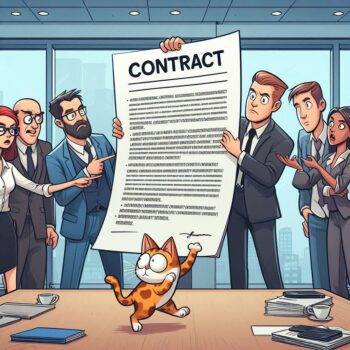
Contracts are a cornerstone of professional and personal agreements, especially for expats living and working in China.
However, navigating contract breaches in a foreign legal system can be daunting.
This guide provides a detailed overview of contract breaches in China, including legal concepts, common scenarios, and actionable steps to resolve disputes.
Whether you’re dealing with employment contracts, housing leases, or business agreements, understanding your rights and remedies is essential.
What Is a Contract Breach?
A contract breach occurs when one party fails to fulfill their obligations as outlined in a legally binding agreement.
In China, contracts are governed by the Civil Code of the People’s Republic of China and specific laws like the Labor Contract Law for employment agreements.
Understanding these legal frameworks is crucial for identifying breaches and pursuing remedies.
| Key Legal Frameworks | Description |
|---|---|
| Civil Code | Governs general contract law, including obligations, breaches, and remedies. |
| Labor Contract Law | Regulates employment contracts, including rights and obligations of employers and employees. |
| Arbitration Law | Provides guidelines for resolving disputes through arbitration. |
Source: China Civil Code Overview
Types of Contract Breaches in China
Contract breaches can take various forms, each with unique legal implications.
Below are the most common types:
| Type of Breach | Description |
|---|---|
| Non-Performance | One party fails to perform their contractual duties entirely. |
| Delayed Performance | Obligations are fulfilled after the agreed timeline, causing potential losses. |
| Defective Performance | Goods or services provided do not meet the agreed-upon standards. |
| Anticipatory Breach | One party indicates they will not fulfill their obligations before the deadline. |
Common Scenarios for Expats
Expats in China may encounter contract breaches in various contexts.
Here are some examples:
1. Employment Contracts
- Employers may fail to pay salaries on time, reduce agreed benefits, or terminate contracts unfairly.
- Expats may also face allegations of breach if they leave a position prematurely without proper notice.
2. Housing Leases
Landlords may refuse to return security deposits, fail to make agreed repairs, or violate lease terms.
3. Business Agreements
Disputes over quality, delivery timelines, or intellectual property violations are common in joint ventures or supplier relationships.
Legal Remedies for Contract Breaches
In China, several legal remedies are available to address contract breaches.
These include:
| Remedy | Description |
|---|---|
| Specific Performance | Courts may order the breaching party to fulfill their contractual obligations. |
| Damages | Compensation for financial losses caused by the breach. |
| Contract Termination | The non-breaching party may terminate the contract if the breach is severe. |
| Negotiation/Mediation | Many disputes are resolved amicably before escalating to litigation. |
Source: China Arbitration Law
Steps to Handle Contract Breaches
If you encounter a contract breach, follow these steps to protect your rights:
1. Review Your Contract
- Carefully examine the agreement to understand the rights and obligations of both parties.
- Pay attention to clauses on dispute resolution, penalties, and applicable laws.
2. Gather Evidence
- Document all relevant communications, invoices, and records.
- Clear and organized evidence is critical for building a strong case.
3. Communicate with the Other Party
Initiate a formal discussion to express your concerns and explore resolution options.
4. Seek Legal Advice
Consult a legal expert familiar with Chinese contract law to determine the best course of action.
5. Pursue Legal Action
- If negotiation fails, escalate the matter to arbitration or court.
- Ensure you have a qualified lawyer to represent your case.
Special Considerations for Expats
Navigating contract breaches as an expat involves unique challenges.
Here are some tips:
| Challenge | Solution |
|---|---|
| Language Barrier | Hire a translator or legal expert to ensure you fully understand the terms. |
| Jurisdiction Clauses | Check if the contract specifies foreign jurisdictions or international arbitration. |
| Cultural Nuances | Approach disputes with cultural sensitivity, leveraging guanxi (relationships). |
| Documentation Standards | Keep meticulous records, as Chinese courts prioritize written evidence. |
Case Studies
Examining real-life scenarios can provide valuable insights.
Below are two examples:
1. Breach of Employment Contract
- An expat teacher in Beijing faced delayed salary payments and reduced benefits.
- After filing a complaint with the local labor bureau, the teacher secured compensation through mediation.
2. Breach of Business Agreement
- A foreign entrepreneur partnered with a local manufacturer to produce goods for export.
- The manufacturer delivered defective products, violating quality standards.
- The entrepreneur pursued arbitration and was awarded damages to cover production losses.
How to Avoid Contract Breaches
Prevention is better than cure.
Here are some tips to minimize risks:
| Tip | Details |
|---|---|
| Draft Clear Contracts | Ensure all terms are clearly defined and agreed upon by both parties. |
| Verify Parties | Conduct due diligence to assess the credibility of employers or partners. |
| Include Dispute Clauses | Add clauses outlining the process for resolving disputes. |
| Monitor Compliance | Regularly review contract performance to identify potential breaches early. |
External Resources
For further assistance, consider the following resources:
- China International Economic and Trade Arbitration Commission (CIETAC)
- China Labor Wath
- Legal Aid in China for Expats
Conclusion
Understanding and addressing contract breaches in China is essential for expats to safeguard their rights and interests.
By familiarizing yourself with Chinese contract law, preparing thoroughly, and seeking professional guidance when needed, you can navigate disputes effectively.
Whether you’re dealing with employment agreements, housing leases, or business contracts, a proactive approach can help you resolve issues and protect your interests.



